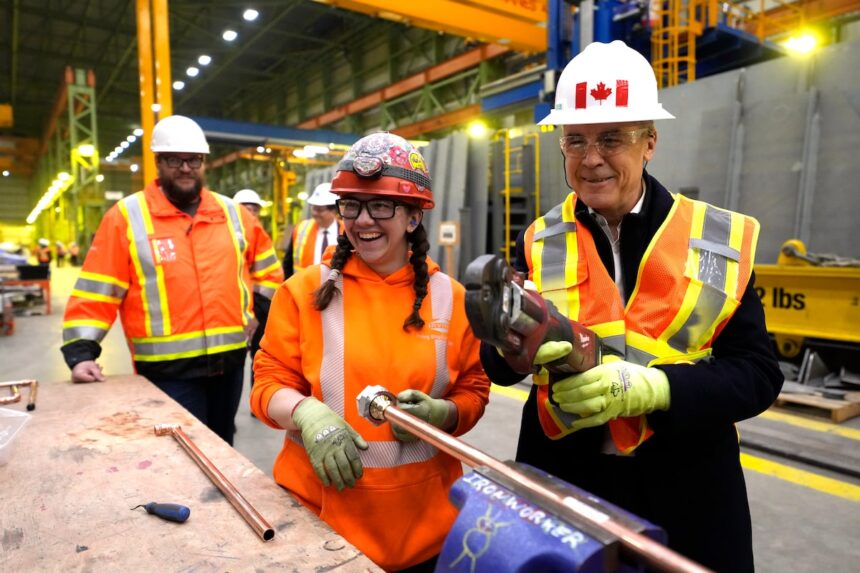In the shadowy corridors of Ottawa’s power centers, a profound transformation is quietly unfolding. Canada, long celebrated as a champion of global trade liberalization, appears to be pivoting toward a more protective economic stance—a shift that could redefine our nation’s approach to international commerce for years to come.
The catalyst behind this policy evolution is unmistakable: the looming specter of Donald Trump’s potential return to the White House. As Trump’s “America First” rhetoric gains renewed momentum across the border, Canadian policymakers find themselves trapped in a reactive posture, scrambling to shield vital domestic industries from potential American protectionism.
“What we’re witnessing isn’t merely tactical positioning—it’s a fundamental recalibration of Canada’s economic philosophy,” explains Dr. Elaine Crawford, senior economist at the Canadian Centre for Policy Alternatives. “After decades of championing free trade, Ottawa is adopting elements of economic nationalism that would have been unthinkable just five years ago.”
This strategic shift manifests across multiple sectors. In critical minerals, the federal government has tightened foreign investment rules, explicitly targeting Chinese acquisitions in lithium and other resources deemed essential for national security. Meanwhile, the Canada Growth Fund has emerged as a powerful tool for channeling public investment into strategic industries—a mechanism that closely resembles industrial policies once criticized by Canadian officials when implemented elsewhere.
Perhaps most telling was Finance Minister Chrystia Freeland’s recent address to the Canadian Chamber of Commerce, where she emphasized the importance of “friend-shoring” and securing supply chains within trusted allied nations. “The era of unfettered globalization is behind us,” Freeland declared, signaling a departure from Canada’s traditional economic orthodoxy.
The irony hasn’t escaped veterans of Canadian politics. For decades, successive governments in Ottawa—both Liberal and Conservative—championed trade liberalization as the cornerstone of Canadian prosperity. Today, those same institutions are crafting policies aimed at insulating Canadian industries from global market forces.
This nationalist turn isn’t occurring in isolation. Across the global economy, countries are retreating from the hyper-globalized models that defined the post-Cold War era. The United States, under both Democratic and Republican administrations, has embraced massive industrial subsidies through the Inflation Reduction Act and the CHIPS and Science Act. The European Union has followed suit with its own Critical Raw Materials Act and Green Deal Industrial Plan.
“What makes Canada’s situation uniquely challenging is our asymmetric relationship with the United States,” notes Professor Michaela Ramirez of the University of Toronto’s Munk School of Global Affairs. “With over 75% of our exports heading south of the border, we simply cannot afford to ignore American economic nationalism, regardless of how committed we might be to multilateralism in principle.”
Industry leaders across Canada have largely embraced this policy evolution, albeit with reservations about its execution. “The direction is necessary given global realities,” acknowledges Thomas Henderson, CEO of the Canadian Manufacturers and Exporters association. “But we need coherent, long-term strategies rather than reactive policies that change with each U.S. election cycle.”
Critics warn that this nationalist turn carries significant risks. Protectionist policies typically increase consumer costs, reduce competition, and may trigger retaliatory measures from trading partners. Moreover, there’s the danger that economic nationalism could undermine the rules-based international trading system that has historically benefited middle powers like Canada.
As Ottawa navigates this complex terrain, fundamental questions loom about Canada’s economic future. Can we balance legitimate national security concerns with our commitment to open markets? Is it possible to implement defensive economic measures without sliding into destructive protectionism? And perhaps most critically, can Canada develop an independent economic vision rather than merely reacting to American policy shifts?
The answers to these questions will shape not just our economic prospects, but our national identity in a rapidly changing world. As global news continues to highlight increasing protectionism, Canadians must grapple with a profound question: In an age of resurgent economic nationalism, what kind of economy do we want to build?










